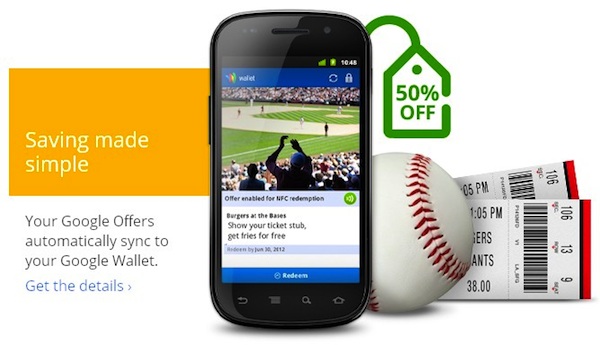Google Offers and Payments: It’s all about Search
If you’ve been awake for any of the past 48 hours, you probably heard about Google’s new Offers product. And you’ve likely read at least one headline that included the words “Groupon Killer”. Most of this coverage has missed the point.
Offers comes just a week after Google’s much anticipated launch of “Wallet” for making payments via NFC-enabled Google smartphones. There’s a lot of strategy behind this one-two-punch, its timing, and how these platforms will interoperate.
After all the talk about Groupon or Square killers, Google’s Offers/Wallet combo won’t really be either. It will lie somewhere between by closing the loop on deal distribution, redemption and payments, in ways not really being accomplished by anyone right now.
This comes down to the continuity of finding deals, saving them to mobile and then paying for them in a way that automatically applies a discount at the point of sale. The beauty is reducing friction for users (no printouts), and enabling clearer ROI for merchants.
But at the heart of all of this, make no mistake, it could just be all about search. As is often the case with Google’s ancillary products, they are in the end a collective moat around its true profit center.

Back to Basics
Before exploring that angle, it would be fair to argue that Offers is partly a diversification play. It’s well known that deals are exploding in a variety of attractive economic models. It’s also well known that Google has been called a “one trick pony”, for its reliance on search.
It was stated quite clearly during Offers’ launch this week at the D9 conference that the revenue play is purely around facilitating deals, a la Groupon’s model. In that sense – and in a short sighted way – this could be a step towards shedding that one trick pony reputation.
But one thing that hasn’t been discussed – even by seasoned reporters Kara Swisher and Walt Mossberg standing a few feet away – is how this plugs into search. This should be addressed, given that search is 97 percent of a nearly $30 billion annual revenue stream.
The answer to the question (that wasn’t asked) is simply that offers and payments can boost advertiser ROI by closing the loop on search. In other words, if Google can show that finished transactions resulted from paid search campaigns, a clearer ROI picture results.
This is important simply because clarity in ROI is the most important factor to SMB ad spending (even more than cost), according to BIA/Kelsey. Google’s interests here are clear, with continued investment in cracking that massive but thick-shelled SMB nut.

Master Plan
Panning back to how Wallet and Offers plug into the value chain, Google clearly has massive search traffic to distribute deals where commercial intent is high. It also has existing campaigns and relationships with millions of large and small advertisers.
Much of this traffic is meanwhile migrating to mobile, where local commercial intent is even higher – recently reaching 40 percent. And don’t forgetAndroid’s exploding market share, which goes a long way in boosting Google’s overall mobile search volume.
Add it all up and Google’s mobile distribution meets offers at a time when both are exploding (Wallet will also be an open platform). Using Offers as a hook, Google Wallet then closes the loop to offline conversion in a way that’s always been missing from search.
What we’re talking about here is the holy grail of search. And Google – relying on search for the vast majority of its revenue – just took a step closer to finding it. In another way, the master plan has come into focus for the loss leader/ Trojan horse that is Android.
Put another way, this is going to be huge.